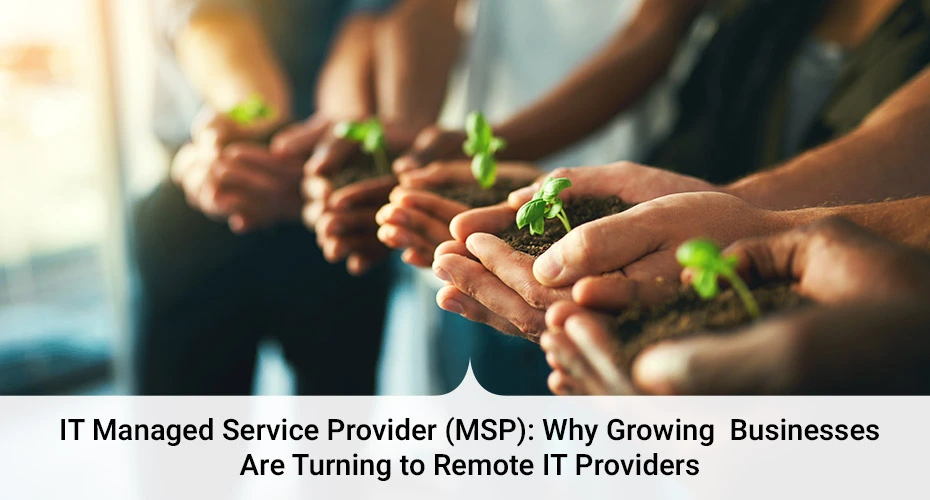November 24, 2025 - by Synoptek
Technology now drives nearly every growth strategy. However, for small and midsize organizations, scaling IT infrastructure, maintaining security, and supporting hybrid workforces can quickly overwhelm in-house teams.
This is why an increasing number of companies are turning to an IT Managed Service Provider (MSP). An IT MSP delivers proactive, remote, and flexible IT services, enabling organizations to offload complex or routine tasks while focusing their internal resources on growth. Whether managed remote desktop services or cloud-based management, MSPs transform how businesses plan and execute IT strategies.

Core Capabilities of an IT Managed Service Provider (MSP)
While many business leaders already understand what an MSP is, few have complete visibility into the full range of services that MSPs deliver. A modern IT Managed Service Provider (MSP) typically offers:
- 24/7 Monitoring & Support – Proactive issue detection and resolution before disruptions occur.
- Cybersecurity Services – Managed detection and response (MDR), patching, endpoint security, and compliance management.
- Cloud & Infrastructure Management – Migration, optimization, and ongoing support for hybrid and multi-cloud environments.
- Managed Remote Desktop Services—Secure, scalable access for hybrid and remote workforces is critical for regions like Denver and Boise, where a Managed IT Services Boise provider helps enable secure connectivity,
- Disaster Recovery & Business Continuity – Ensuring critical systems remain available through redundancy and tested recovery protocols.
According to Fortune Business Insights, the managed services market is expected to grow from USD 330.37 billion in 2025 to USD 878.71 billion by 2032, underscoring businesses’ reliance on MSP capabilities across these areas.
Why Growing Businesses Are Turning to MSPs
As businesses scale, the demands on IT become more complex and costly. IT MSPs offer a smarter path—delivering cost savings, stronger security, and flexible IT support that grows alongside the organization.
1. Cost Efficiency and Predictability
MSPs reduce the need for large capital expenditures on IT staff, tools, and infrastructure. Instead, organizations benefit from predictable monthly service agreements.
- No need to hire full-time cloud, security, or compliance specialists.
- Reduced downtime through proactive monitoring lowers hidden costs.
- Flexible pricing models help businesses adapt as they grow.
Research projects that the managed services market will surpass USD 1.27 trillion by 2035, primarily fueled by organizations seeking predictable IT costs.
2. Enhanced Cybersecurity and Compliance
Cyberattacks are evolving faster than most internal teams can manage. IT Managed Service Providers (MSPs) provide 24/7 monitoring, incident response, and compliance expertise.
- Access to enterprise-grade security tools without buying licenses directly.
- Compliance frameworks (HIPAA, GDPR, PCI DSS) delivered as part of managed services.
- Regular security audits to keep systems resilient.
Canalys forecasts that MSP-led cybersecurity services will grow by 13% in 2025, as businesses seek partners to handle mounting threats.
3. Remote Workforce Enablement
Hybrid and remote work models require secure, seamless connectivity. MSPs deliver solutions, such as managed remote desktop services in Boise and other U.S. regions, to ensure employees can work anywhere without compromising security.
- Secure VPNs and multi-factor authentication.
- Centralized patch management for remote endpoints.
- Continuous monitoring of remote access sessions.
Mordor Intelligence reports that cloud-hosted managed services, driven by the adoption of remote work, accounted for 58.62% of the North American market in 2025.
4. Scalability and Flexibility
When a business expands — whether adding staff or launching new operations — IT MSPs help scale IT infrastructure quickly.
- Rapidly deploy new desktops, servers, or cloud environments.
- Scale cybersecurity protections to cover new users instantly.
- Eliminate long hiring cycles by using MSP expertise on demand.
The KPMG Managed Services Outlook 2025 highlights that 60% of organizations use MSPs for application management at some level, reflecting scalability as a top driver.
5. Strategic IT Alignment
An IT Managed Service Provider (MSP) helps free up internal IT teams from routine maintenance tasks, allowing them to focus on innovation.
- Launch digital transformation projects faster.
- Adopt cloud and AI technologies without overburdening staff.
- Shift IT leadership toward business growth initiatives.
According to KPMG’s 2025 Outlook, 37% of companies leverage MSPs at scale for R&D support, enabling IT leaders to focus on strategic value rather than tactical firefighting.
The Future of IT with MSPs
The IT landscape is shifting toward automation, AI integration, and cloud-first strategies. IT MSPs are positioned at the center of this shift.
- AI-driven automation will reduce response times and improve incident detection.
- Cloud-first strategies will make MSPs indispensable in migration and optimization.
- Hybrid work will continue to drive demand for managed remote desktop and endpoint services.
Conclusion
An IT Managed Service Provider (MSP) offers growing businesses the remote support, security, and flexibility needed to thrive in today’s fast-changing environment. Whether you’re looking for Managed IT Services in Boise or managed remote desktop services, MSPs enable businesses to build IT strategies that are resilient today and future-ready tomorrow.
If your organization is ready to strengthen IT operations and scale confidently, contact Synoptek to explore how our MSP services can transform your IT strategy.
Frequently Asked Questions
1. How does an IT Managed Service Provider (MSP) differ from traditional outsourcing?
2. Are MSPs suitable for small businesses or only large enterprises?
3. How do MSPs support remote and hybrid teams?
4. Why should I consider a local MSP offering Managed IT Services in Boise or Denver?
5. What’s the long-term advantage of working with an MSP?
